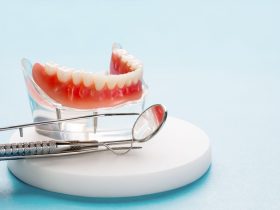Root canal treatment describes an endodontic therapy for the pulp, often compromised when tooth decay, infection, or trauma has led to a breach in its protective layer. Root canal therapy usually takes place under local anesthesia and involves the removal of diseased tissue and filling canals with a naturally-growing mineral called gutta-percha. Taking care after a root canal is essential and below are some of the most valuable tips:
Read Also:Understanding All About Cosmetic Dentistry For Your Oral Care
Brush Your Teeth
The first thing to do is to brush your teeth, ideally using toothpaste with fluoride. Use a soft brush with short strokes, as this will not scratch the sensitive tissue in the mouth. Brush your teeth gently and in small circular motions to ensure that all teeth surfaces are covered. If you have had a root canal treatment, it is important to take extra care when brushing your teeth. Be aware that you may still have some nerve endings where the tooth has been treated, so brushing too hard may be very painful. Brushing also removes food particles, plaque and bacteria that can cause infection if left in place.
Floss Your Teeth
After a root canal treatment, it can be hard to get between the teeth to brush and floss your teeth. Flossing is the best way to remove plaque from around the tooth and between teeth Flossing is best done by holding the floss between your thumb and pointer finger and then gently cleaning each tooth. Use a clean section of the floss at the end of each tooth, and be sure not to snap or tie knots in the floss to avoid damaging other teeth. Removing all the plaque ensures that the tooth can re-harden and heals properly.
Don’t Eat Hard Foods
While nothing beats a great meal, you should be careful about how you chew it. Avoid crunchy foods like raw vegetables and cut your steak into small pieces so that the chewing process is softer on your teeth and the root canal filling. Also, avoid chewing with the tooth treated, so try to use the cheek with your other teeth. If you can’t resist the urge to bite into a treat, try to find something that melts down easily. Wriggly foods like jelly will soften and break down nicely, but soft foods like ice cream or even bubble gum should also be avoided during a root canal treatment. The pressure from chewing can damage the filling and affect its sealability.
Use a Mouth Wash
If you drink soda regularly, your doctor may suggest a mouthwash that contains fluoride after a root canal treatment. Mouthwashes also have an anti-bacterial effect and add extra cleaning and polishing to your brushing and flossing routines. You may also need to take antibiotics or painkillers daily to promote the healing of the teeth and gum tissues while they are being treated. A basic mouthwash with these ingredients should be safe, but it’s a good idea to take the doctor’s advice if you don’t know the right product.
Use Warm Water to Soothe the Treated Area
Rinsing your mouth with warm water is often just as effective as using a thermometer to measure body temperature. It should be done every morning and right before bedtime to help your body start its day off correctly and to help the healing process by warming up the inside of your mouth. This will also loosen any dried-on crust that may have formed overnight after taking medication the day before. Also, warm water helps bring down the temperature of your gum tissues and makes them much more receptive to the pain relievers you may need during a root canal.
Take Your Medicine as Prescribed and Schedule for Follow-up
You will be given instructions about how often to take your painkillers or antibiotics and what side effects to expect. Still, some people may be better off taking the drugs longer than recommended. A dentist will write you a date for your next checkup to assess the new filling and chat about any problems or concerns you may have. Ensure that you stick to that appointment and always tell the specialist if you notice any problems with the tooth or your mouth so that the treatment can be adjusted.
Conclusion
Taking care of your teeth after a root canal treatment is very important for the health of your remaining teeth and for preserving the treated tooth. Taking medicine, brushing and flossing, avoiding hard foods and keeping a good diet are all important. Still, it would be best if you also talked to your specialist about how to make it easier to handle any pain or discomfort you may be feeling.








Leave a Reply